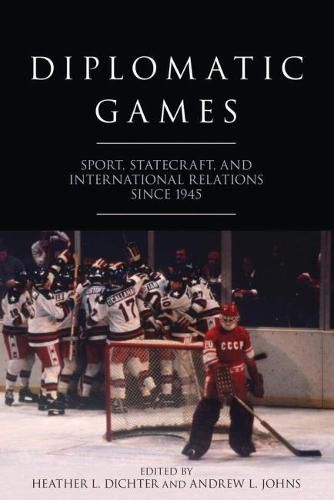Readings Newsletter
Become a Readings Member to make your shopping experience even easier.
Sign in or sign up for free!
You’re not far away from qualifying for FREE standard shipping within Australia
You’ve qualified for FREE standard shipping within Australia
The cart is loading…






This title is printed to order. This book may have been self-published. If so, we cannot guarantee the quality of the content. In the main most books will have gone through the editing process however some may not. We therefore suggest that you be aware of this before ordering this book. If in doubt check either the author or publisher’s details as we are unable to accept any returns unless they are faulty. Please contact us if you have any questions.
International sporting events, including the Olympic Games and the FIFA World Cup, have experienced profound growth in popularity and significance since the mid-twentieth century. Sports often facilitate diplomacy, revealing common interests across borders and uniting groups of people who are otherwise divided by history, ethnicity, or politics. In many countries, popular athletes have become diplomatic envoys. Sport is an arena in which international conflict and compromise find expression, yet the impact of sports on foreign relations has not been widely studied by scholars.
In Diplomatic Games, a team of international scholars examines how the nexus of sport and foreign relations has driven political and cultural change since 1945, demonstrating how governments have used athletic competition to maintain and strengthen alliances, promote policies, and increase national prestige. The contributors investigate topics such as China’s use of sports to oppose Western imperialism, the ways in which sports helped bring an end to apartheid in South Africa, and the impact of the United States’ 1980 Olympic boycott on U.S.-Soviet relations. Bringing together innovative scholarship from around the globe, this groundbreaking collection makes a compelling case for the use of sport as a lens through which to view international relations.
$9.00 standard shipping within Australia
FREE standard shipping within Australia for orders over $100.00
Express & International shipping calculated at checkout
This title is printed to order. This book may have been self-published. If so, we cannot guarantee the quality of the content. In the main most books will have gone through the editing process however some may not. We therefore suggest that you be aware of this before ordering this book. If in doubt check either the author or publisher’s details as we are unable to accept any returns unless they are faulty. Please contact us if you have any questions.
International sporting events, including the Olympic Games and the FIFA World Cup, have experienced profound growth in popularity and significance since the mid-twentieth century. Sports often facilitate diplomacy, revealing common interests across borders and uniting groups of people who are otherwise divided by history, ethnicity, or politics. In many countries, popular athletes have become diplomatic envoys. Sport is an arena in which international conflict and compromise find expression, yet the impact of sports on foreign relations has not been widely studied by scholars.
In Diplomatic Games, a team of international scholars examines how the nexus of sport and foreign relations has driven political and cultural change since 1945, demonstrating how governments have used athletic competition to maintain and strengthen alliances, promote policies, and increase national prestige. The contributors investigate topics such as China’s use of sports to oppose Western imperialism, the ways in which sports helped bring an end to apartheid in South Africa, and the impact of the United States’ 1980 Olympic boycott on U.S.-Soviet relations. Bringing together innovative scholarship from around the globe, this groundbreaking collection makes a compelling case for the use of sport as a lens through which to view international relations.